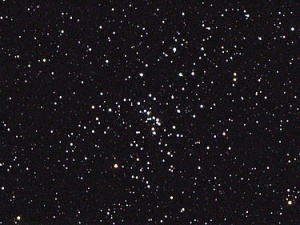Messier 48: Difference between revisions
Appearance
No edit summary |
No edit summary |
||
| Line 5: | Line 5: | ||
There is actually no cluster in the position indicated by Messier. The value that he gave for the right ascension matches that of NGC 2548, however, his declination is off by five degrees.[1] Credit for discovery is sometimes given instead to Caroline Herschel in 1783. | There is actually no cluster in the position indicated by Messier. The value that he gave for the right ascension matches that of NGC 2548, however, his declination is off by five degrees.[1] Credit for discovery is sometimes given instead to Caroline Herschel in 1783. | ||
M48 is visible to the naked eye under good atmospheric conditions. Its age is estimated to amount 300 million years. | M48 is visible to the naked eye under good atmospheric conditions. Its age is estimated to amount 300 million years.<ref>[http://en.wikipedia.org/wiki/Messier_48 Messier 48]</ref> | ||
Latest revision as of 23:23, 2 April 2015

Messier 48 (also known as M 48 or NGC 2548) is an open cluster in the Hydra constellation. It was discovered by Charles Messier in 1771.
There is actually no cluster in the position indicated by Messier. The value that he gave for the right ascension matches that of NGC 2548, however, his declination is off by five degrees.[1] Credit for discovery is sometimes given instead to Caroline Herschel in 1783.
M48 is visible to the naked eye under good atmospheric conditions. Its age is estimated to amount 300 million years.[1]
HGS Session References
HGS Sessions - Clearing San Francisco Golden Gate Bridge, 55 Reversal Grid - 3/31/2015 [2]
References
- ↑ Messier 48
- ↑ HGS Session
Found in HGS Manual on Page 108
Found in HGS Manual on Page 115

